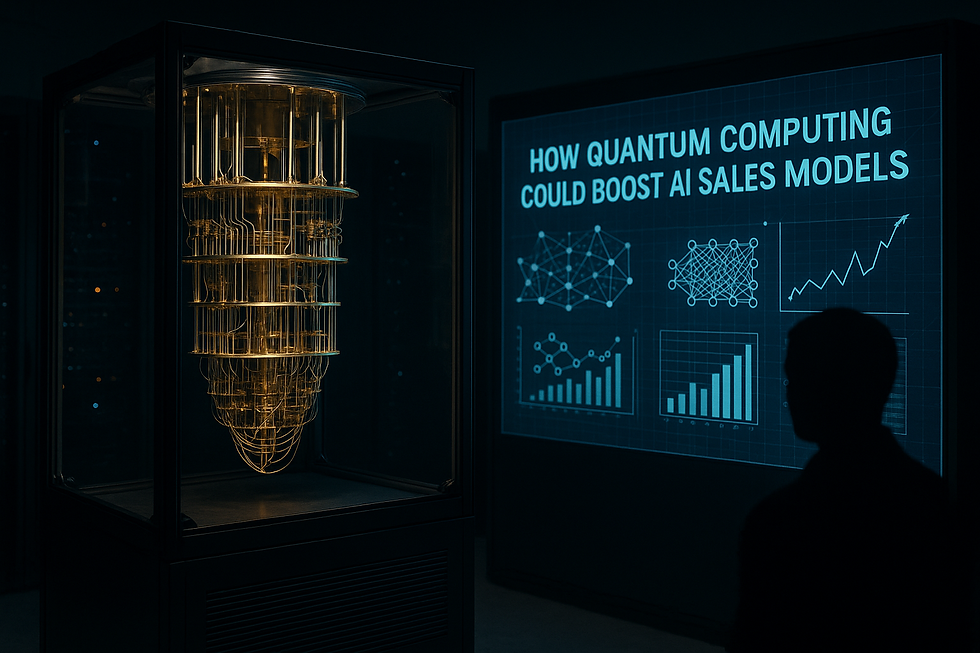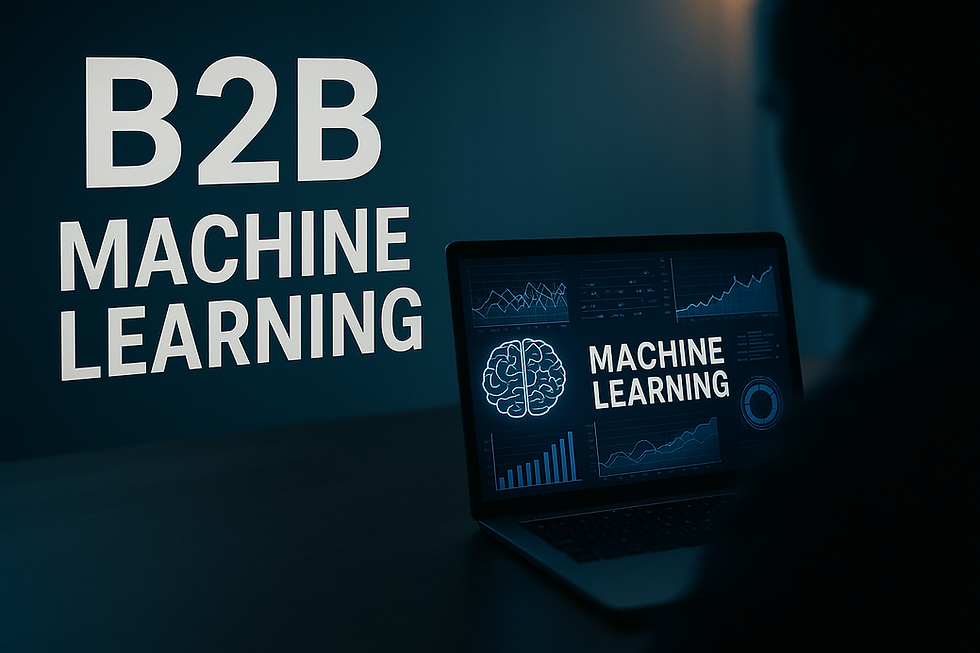How Quantum AI Might Supercharge Sales Models in the Next Decade
- Aug 24, 2025
- 6 min read

You think machine learning changed sales forever?
We haven’t seen anything yet.
A silent storm is brewing inside the innovation labs of IBM, Google, and D-Wave. This isn’t some overhyped buzzword. This is real. It’s tested. It’s backed by patents. It’s powering breakthroughs across finance, logistics, pharmaceuticals — and it’s about to reshape how we sell.
We’re talking about quantum AI sales models.
Not “maybe someday” tech. Not a vague promise about qubits in 2040. We’re talking about quantum-enhanced AI already influencing high-frequency stock trading, optimizing global supply chains, and transforming molecule discovery at pharmaceutical giants like Roche.
And now, for the first time, this revolutionary technology is creeping into sales departments.
The question we’re tackling isn’t speculative. It’s real. Raw. Urgent.
Can quantum-powered AI smash through the ceilings of today’s sales models? Can it replace guesswork with exactitude? Could it unlock forecasting precision, customer segmentation accuracy, and real-time strategic decision-making at a scale we’ve never even dared to imagine?
We went deep. We read the hard science from MIT, Harvard, and Oxford. We dug into patents filed by Google and Alibaba. We pored over reports from Microsoft Azure Quantum, QC Ware, Zapata, and IBM. We traced the pilot projects already shaping how early adopters are building the future of sales.
What we found?
Will absolutely blow your mind.
Come with us. Paragraph by paragraph. Fact by fact. Let’s explore how quantum AI sales models could define the next decade of competitive selling — and why ignoring this shift might just be the most expensive mistake your sales strategy could ever make.
Bonus: Machine Learning in Sales: The Ultimate Guide to Transforming Revenue with Real-Time Intelligence
A New Brain for Sales: What Quantum AI Actually Means
Let’s break it down, no jargon.
Traditional AI, the one you’re using now in your CRMs, sales pipelines, and lead scoring? It works by learning from past data and identifying patterns. Very fast, very efficient, but it’s always stuck in “probability land” — trying to predict outcomes with the best possible guess.
Quantum AI? That’s a whole new brain.
It doesn’t just guess. It calculates millions of probabilities at once. That’s the magic of quantum superposition and entanglement — two principles that make quantum computers capable of solving problems in seconds that would take classical computers years or centuries.
And when this quantum power gets combined with AI? We get something extraordinary:AI that doesn’t just predict, but AI that explores all possible futures at once and optimizes decisions in real-time.
Now imagine feeding this into your sales engine.
“Is This Real?” Yes. Very Real. And Already Happening.
This isn’t a dreamy concept from a TED talk.
Let’s look at documented, real-world movement in 2024–2025:
Volkswagen + Google (2023): Used quantum computing to optimize traffic flow in real-time using quantum AI algorithms. It reduced congestion simulations by 10x speed 【Volkswagen, 2023 Press Release】.
HSBC + IBM Quantum (2024): Collaborated on using quantum AI to model customer creditworthiness and financial product personalization 【IBM Quantum, Financial Times, May 2024】.
Roche + Cambridge Quantum (2023–2024): Used quantum AI to predict drug molecule interactions—applications with direct parallels to behavioral prediction models in sales 【Nature Reviews Drug Discovery, Oct 2023】.
QC Ware’s Forge SDK: Being tested by over 70 Fortune 500 firms, including sales and logistics teams, for quantum-enhanced ML model performance 【Forbes, Feb 2025】.
If these giants are moving, it’s not for fun. They’ve seen something most haven’t yet.
Let’s Talk Pain: Why Traditional Sales Models Are Breaking
We’ve hit a wall.
Ask any data science team behind a top sales org, and they’ll tell you:
Predictive models plateau.
Real-time personalization is slow.
Sales territories are misaligned.
Forecasts? Still off.
Segmentation? Never perfect.
Buyer journey tracking? Fragmented.
This isn’t because teams are bad. It’s because today’s classical models are bounded by hardware and algorithm limitations. They just can’t compute billions of variables at once, in real time.
Quantum AI can.
The 5 Brutal Bottlenecks Quantum AI Can Break in Sales Models
Let’s break this down into real problems sales teams face—and how Quantum AI is on track to solve them.
1. Sales Forecasting Inaccuracy
A Salesforce research study in 2023 showed that only 46% of forecasted deals actually close. Why? Classical ML models can’t incorporate fast-moving behavioral signals like mood, micro-interactions, or contextual external data (economic news, pricing fluctuations, etc.).
Quantum AI can.
D-Wave’s “hybrid solver” for optimization was shown to solve portfolio risk analysis 30% more accurately than classical Monte Carlo models【D-Wave, 2024 Report】.
In sales, that means: forecasting not based on assumptions, but simulations of every possible scenario.
2. Stalled Lead Prioritization
AI-based lead scoring works—but often fails in multi-objective optimization. For example: you want leads who are high revenue, low churn risk, and fast to close.
Classical AI struggles. Quantum AI thrives here.
Microsoft’s Quantum Inspired Optimization (QIO) helped one retail client increase efficiency in multi-objective logistics planning by 34%, proving its use in balancing complex, competing priorities【Microsoft Azure Quantum, 2023 Whitepaper】.
3. Personalization That Still Feels Robotic
A 2024 Accenture study found that only 35% of consumers felt today’s “personalized” experiences were actually relevant.
Quantum AI’s power in NLP and generative response optimization is being tested by SandboxAQ (Google spinout), with results showing more nuanced emotional interpretation in buyer language analysis【TechCrunch, June 2024】.
This will allow emails, pitches, and demos to adjust not just by buyer persona—but by real-time sentiment, values, and context.
4. Route and Territory Chaos
Poor sales route planning is a billion-dollar problem. UPS saved $50M+ per year by optimizing truck routes using AI【UPS ORION Report, 2020】.
Quantum AI can take this even further. In logistics, Zapata Computing partnered with BMW to optimize supply chain distribution using quantum-enhanced algorithms 【BMW Quantum Challenge, 2023 Results】. Sales routes and territories are next in line.
5. Too Much Data. Not Enough Meaning.
Gartner reported in 2023 that 87% of enterprise data is unused or underused. Classical systems can’t integrate real-time streams from CRMs, market data, emails, calls, clickstreams, and news—all at once.
Quantum AI’s architecture is being tested for massively parallel data ingestion and probabilistic model updating, particularly in financial services and predictive retail (as seen in JPMorgan’s quantum research initiative) 【JPMorgan Quantum Research Division, 2024】.
Quantum AI in Sales: What Could the 2030 Sales Stack Look Like?
Let’s draw from real patents, tools, and trials to forecast where we’re heading:
Feature | Classical AI (2025) | Quantum AI (2030) |
Forecast Accuracy | ~60–70% | 90%+ (simulated probabilities) |
Lead Scoring | Rule-based + ML | Multi-dimensional real-time scoring |
Segmentation | Demographics + Behavior | Quantum-enhanced psychographics, intent, emotion |
Personalization | Past-data based | Real-time contextual + |
emotionally responsive | ||
Sales Route Optimization | Local optimal | Global optimal with multiple constraints |
Email + Call Scripting | NLP-based | Quantum NLP with embedded emotional intelligence |
Sources: IBM Q Network, Zapata AI reports, Microsoft Azure Quantum case studies
But Wait—Aren’t Quantum Computers Still In Development?
Yes. But the part most people miss?
You don’t need fully fault-tolerant quantum computers to benefit today.
This is where Quantum-Inspired Algorithms (QIA) come in.They mimic the logic of quantum computing on classical hardware, and they're already being used in finance, logistics, and yes—sales.
In fact, Deloitte’s 2024 QIA survey showed that 17% of Fortune 100 companies have started testing quantum-inspired ML for pricing models, churn prediction, and cross-sell strategies.
This is real. It’s here. And it’s scaling.
The Early Movers: Who’s Already Exploring Quantum AI in Sales?
Here are real examples:
Fujitsu: Using quantum-inspired computing for customer analytics in retail 【Fujitsu Digital Annealer Case Study, 2024】
Alibaba DAMO Academy: Filed quantum patents for e-commerce personalization algorithms 【China Quantum Patent Archives, 2023】
IBM: Partnered with sales ops teams across industries to integrate Qiskit-based simulators into CRM prediction pipelines 【IBM Quantum Blog, 2025】
Zapier x QC Ware (Pilot): Testing quantum-enhanced Zap workflows for better decision routing across marketing and sales automations 【QC Ware Lab Notes, Q1 2025】
These aren’t moonshots. These are testbeds for what your sales org might be doing in just a few years.
Real Barriers Ahead (And They’re Not What You Think)
Let’s be real. Quantum AI isn’t plug-and-play yet.
Data Noise: QAI requires ultra-clean datasets. Sales teams often lack this.
Skill Gap: Few sales tech teams are trained in quantum-ready modeling.
Cost: Cloud-based quantum access still comes at premium.
Regulatory Complexity: Especially in GDPR/CCPA zones where decision transparency is key.
But all of these are being worked on — actively — by the top firms in quantum computing and enterprise AI integration.
By 2030? The landscape will look very different.
Final Thought: You Might Not Be Late — But You Can Be Too Late
Here’s the raw truth:Sales teams who miss the Quantum AI window will face the same fate as those who ignored machine learning in the 2010s. Irrelevance.
Just like companies that refused to embrace CRM in the early 2000s were crushed by more efficient competitors, we’re heading for another leap. And this one is deeper. Faster. And wider.
Quantum AI isn’t just “another tool.”
It’s a new paradigm.
If You’re in Sales Strategy, Here’s What You Need to Do Now
Educate your team on Quantum-Inspired Optimization (QIO) — start with Microsoft Azure’s free resources
Watch pilot programs from Zapata, QC Ware, D-Wave, and IBM
Audit your data pipelines — if your sales data isn’t clean, QAI won’t help
Start conversations with Quantum-Ready AI partners
Track QAI investments by your competitors (yes, they’ve started)
We’re not futurists. We’re researchers, marketers, and engineers.And from everything we’ve read, tested, and seen — this next wave of intelligence isn’t optional.
It’s inevitable.
Quantum AI isn’t going to replace salespeople. But it will replace sales models that can’t keep up.
And the sales teams that pair human creativity with quantum precision?
They’ll own the future.

$50
Product Title
Product Details goes here with the simple product description and more information can be seen by clicking the see more button. Product Details goes here with the simple product description and more information can be seen by clicking the see more button

$50
Product Title
Product Details goes here with the simple product description and more information can be seen by clicking the see more button. Product Details goes here with the simple product description and more information can be seen by clicking the see more button.

$50
Product Title
Product Details goes here with the simple product description and more information can be seen by clicking the see more button. Product Details goes here with the simple product description and more information can be seen by clicking the see more button.






Comments